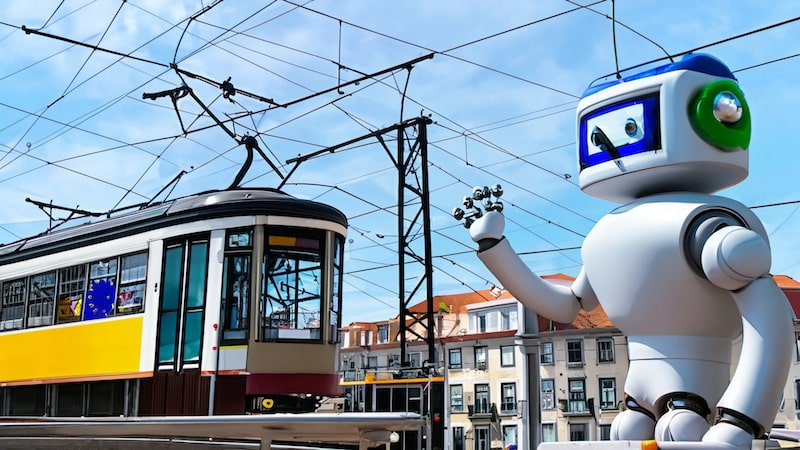In the vibrant heart of Lisbon, a computer scientist embarks on a quest for data. This hunt isn’t for sport or leisure; it’s a mission to reshape the urban landscape. Lisbon, like many other cities worldwide, is at a crossroads – a juncture where technology, data, and artificial intelligence converge to pave the way for smarter, more livable cities. In this article, we delve into the groundbreaking work of researchers in Lisbon, Portugal, who are at the forefront of a global movement that seeks to harness AI and digital twins to revolutionize urban living.
The Digital Twin Revolution
Meet Dr. José Silva, the visionary leader of the “City Digital Twin Pivot Project.” Driven by a relentless passion for transforming urban life, his team is diligently crafting a digital replica of a central neighborhood in Lisbon. This ambitious endeavor, part of a broader initiative called GATE, relies on vast datasets gathered from across the city. These datasets, collected through various means such as sensors and monitoring stations, are the lifeblood of digital twins – virtual models that replicate real-world environments.
Are you eager to venture into the world of Data Science but hindered by budget constraints to hire an in-house data scientist? Look no further than NOD – your gateway to success! With a dedicated team of seasoned Data Scientists at your disposal, we provide full-time support to supercharge your operations.
Why bear the weight of data analysis alone when you can lean on NOD for expert assistance? Our platform allows you to tap into the expertise of experienced Data Scientists without breaking the bank. Say goodbye to the worries of managing data complexities and embark on your journey to data-driven growth!
Join NOD Academy today and embrace a future powered by data-driven insights. Don’t let budget limitations hold you back from unleashing your true potential. Take the first step towards success with NOD!” Click here and go to the Academy page.
Europe’s Stance on AI
Europe, often considered a global stronghold of privacy, has taken an ambitious step forward. The European Union (EU) has drafted what’s hailed as the world’s most comprehensive legislation on AI. The proposed laws aim to regulate AI according to the risks they pose, mitigating issues such as bias and disinformation. While some view this as a blessing, others, including European business executives, fear it may jeopardize the continent’s competitiveness.
Balancing Regulation and Innovation
The debate centers on striking a balance between regulation and innovation. Stricter rules can provide much-needed safeguards for citizens, but overregulation risks stifling investment. A cautious approach is essential to ensure Europe remains a hub for technological advancements.
Europe’s Investment Challenge
One hurdle Europe faces in the AI race is investment. While private AI investment in Europe is on the rise, it still lags behind China and the United States. To attract investors, Europe must strike the right balance between regulation and opportunity.
A European Renaissance
Despite these challenges, Europe is confident in its potential. Brussels insists that Europe is well-positioned in the AI race. While giants like Chat GPT dominate headlines, smaller European models are emerging, showcasing Europe’s innovation process. Europe may have a slight delay, but it remains a contender in the global AI arena.
The Power of Data
The data collected ranges from traffic patterns, air quality, and noise levels to rain measurements and wind speed. Armed with this information, researchers gain a deep understanding of how the city functions. They can simulate scenarios, asking questions like, “What if we change this street?” or “How will this new building affect air flow and pollution?” These simulations empower decision-makers to experiment with urban planning, energy conservation, and public health, all before a single brick is laid.
AI as the Catalyst
But it’s not just data that fuels this transformation. AI plays a pivotal role in deciphering the intricate relationships within the digital twin. Through AI algorithms, researchers generate insights, suggesting ways to enhance livability. These suggestions span energy efficiency measures to improving walkability, ensuring that cities remain vibrant, eco-friendly, and people-centric.
A Global Movement
Lisbon is just one piece of a global puzzle. From Santiago de Chile to Hyderabad, cities worldwide are adopting AI-driven initiatives to usher in the future of urban living. These smart cities represent visible manifestations of an otherwise hidden revolution – AI’s penetration into our daily lives.
AI: Redefining Success
The global AI landscape is evolving, and two categories emerge: those with access to the best AI models and those without. However, success should not be measured solely by investment or innovation. Europe is pioneering efforts to define AI’s ethical boundaries, putting people’s rights at the forefront.
Collaboration: The Key to Progress
As Lisbon’s researchers strive to expand their digital twin project, collaboration emerges as a critical theme. Dr. Silva envisions scaling the project to cover entire cities and collaborating with counterparts worldwide. This sentiment resonates with AI pioneers, who emphasize that progress is not a solo endeavor but a collective one.
The digital twin revolution is underway, and Europe is at the forefront, championing the responsible use of AI to transform cities. While challenges persist, a delicate balance between regulation and innovation can pave the way for a European AI renaissance. As cities across the globe embrace AI and digital twins, the path to a smarter, more livable future becomes clearer. It’s a journey driven not by competition but by collaboration, with the goal of creating cities where people thrive, innovation flourishes, and progress knows no bounds.





